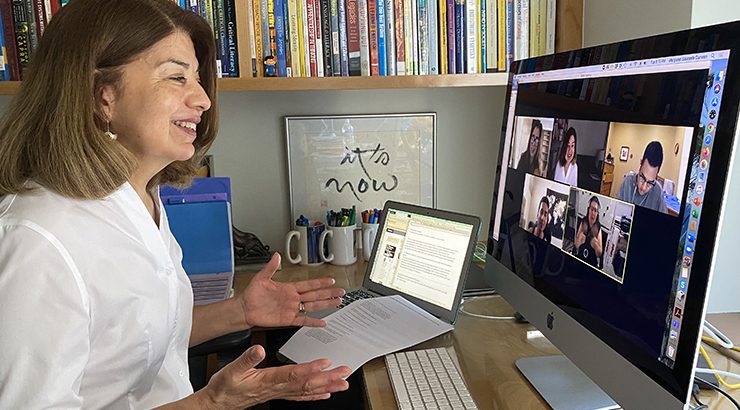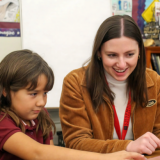
Chapman’s Kathleen Muth Reading Center Offers Remote Tutoring to OC Families
July 29, 2020
Since 1978, Chapman University’s Kathleen Muth Reading Center has provided elementary and middle school students in Orange County with one-on-one reading and writing support. The center’s reading clinic, a cornerstone of Chapman’s Teacher Education (TE) program, gives teaching credential candidates in the Attallah College of Educational Studies opportunities to practice their coursework and skills.
But when Chapman shifted to online instruction in March due to the pandemic, the Reading Center had to adapt and re-tool to meet the needs of local families and Chapman teachers-in-training.
After a few weeks of intense planning, a virtual Kathleen Muth Reading Center was launched in June for a 12-week summer session.

Natalie Miranda ’21, Chapman MA in Teaching and teaching credential student, tutoring local OC student
Summer Pilot Program
Margie Curwen, Ph.D., the faculty director of Chapman’s Kathleen Muth Reading Center and course instructor, explained that the Reading Center team had to transform an in-person instructional program with traditional paper-and-pencil experiences while ensuring a compelling experience the children and their Chapman tutors.
“The Reading Center serves our Chapman students and our community in supporting young learners. Based on the literacy growth of the children, praise from families, and positive feedback from our Chapman students, we know it makes a difference,” said Dr. Curwen. “So, we had to ask ourselves: How can we preserve that, make it compatible with Zoom, and meaningful for the learners? We were driven by those questions.”
The project’s team collaborators included other Teacher Education program coordinators, literacy course instructors, and field supervisors. Led by Dr. Curwen, the effort began with compiling lists of online educational resources and digital books. With help from Chapman’s IS&T department, they devised a plan to provide one-on-one literacy tutoring, assessments, and live discussions, all via home computers and other electronic devices.
To achieve this, the online tutoring required scheduled Zoom calls during which Chapman credential candidates (tutors) met with children while being continually observed by a reading supervisor to ensure quality of instruction. Chapman students prepared and implemented lesson plans during 40-minute tutoring sessions. Attallah course instructors strategically entered in and out of the Zoom sessions to observe, assess, and guide instruction. Afterward, the course instructors, reading supervisors, and Chapman students met for coaching sessions, much like they would during a regular semester.
In its pilot online program this summer, the Chapman Reading Center has provided reading and writing tutoring for the children from 26 families.
Dr. Curwen said there were a few technical kinks in the beginning, but the Chapman students, children, and families have adapted beautifully: “We’ve been able to preserve the integrity of our tutoring program and the quality of the education for our Chapman students.”
Fall Virtual Program Expansion
Carol Roughton, staff director of the Reading Center, commented that it was especially important to continue tutoring this summer because many children found their lives so disrupted in the spring due to school closures.
“Our program offers children one-on-one help, as opposed to having the whole classroom online at the same time,” said Carol. “Most of the children we serve need a little extra help to build their self-confidence so they can improve academically. The parents are grateful for the opportunity for their child to attend our online tutoring.”
Given the uncertainty for school campuses reopening this fall, educators are having to adapt to new learning environments. The challenges that the Reading Center faced this summer — unstable Internet connections and limited access to home computers and devices— mirror some of the same challenges facing K-12 teachers, students, and families across the state.
The summer program’s success has meant that it will resume services in the fall. Dr. Curwen is also exploring how to add to the program’s instructional design and perhaps provide “learning kits” of literacy materials for students and their families in order to help them be successful during at-home learning.
As Dr. Curwen watched Chapman students teach their children during the first summer online clinic, she realized how successful this program could be.
“Looking at the children’s faces, to see them engaged, to see them interested, to see them listening to their tutors was proof that we are able to support these children,” she recalled. “We are accomplishing our goal. With a little ingenuity and creativity, we’re still able to build these relationships and help these children be successful.”
To support the Kathleen Muth Reading Center and Attallah College Teacher Education programs, make a gift today.

